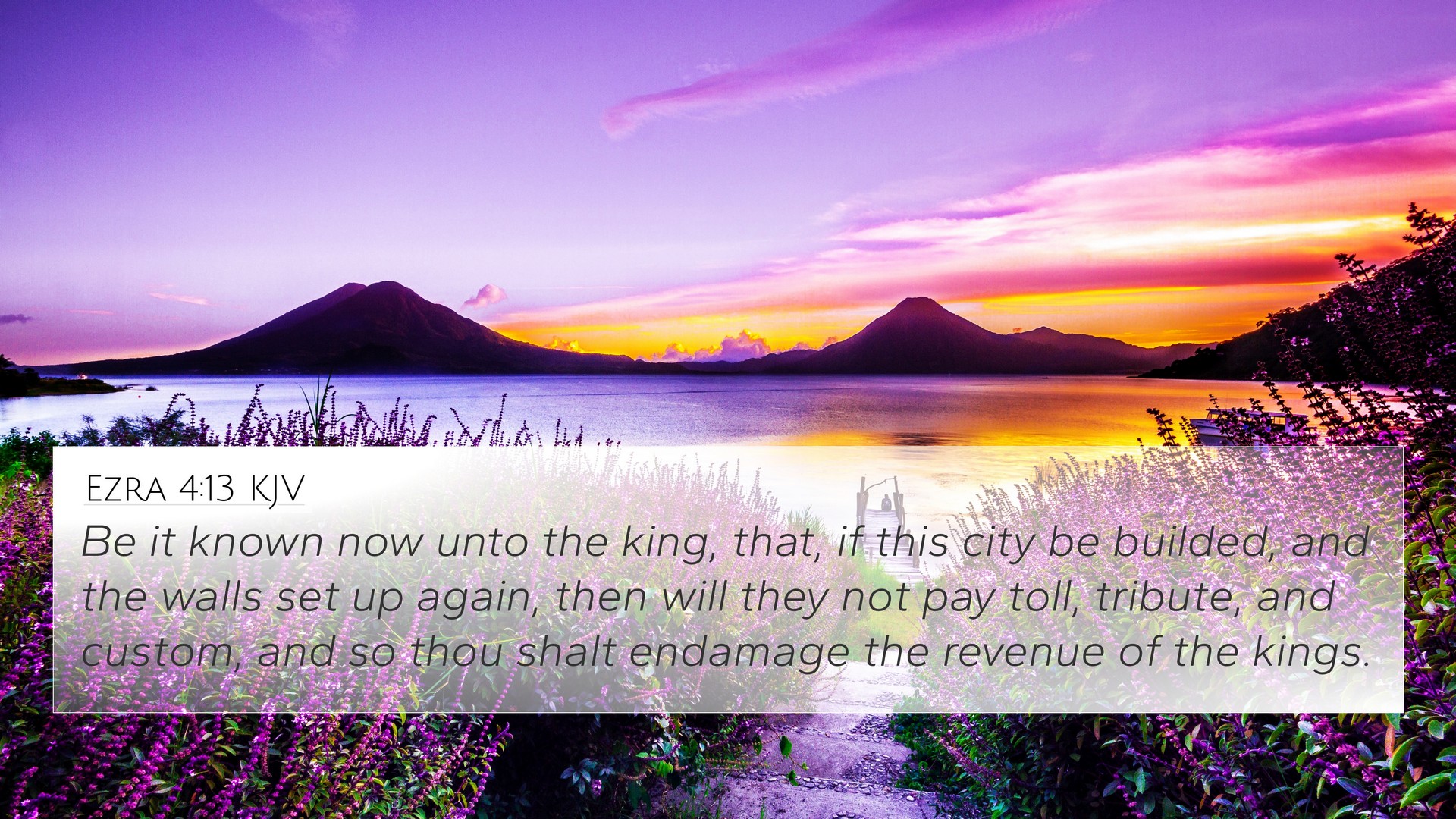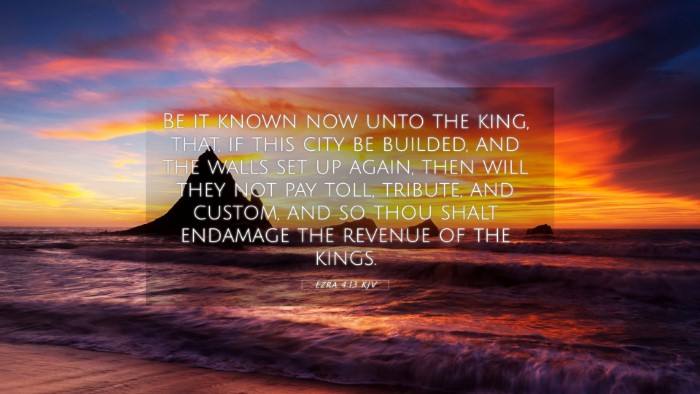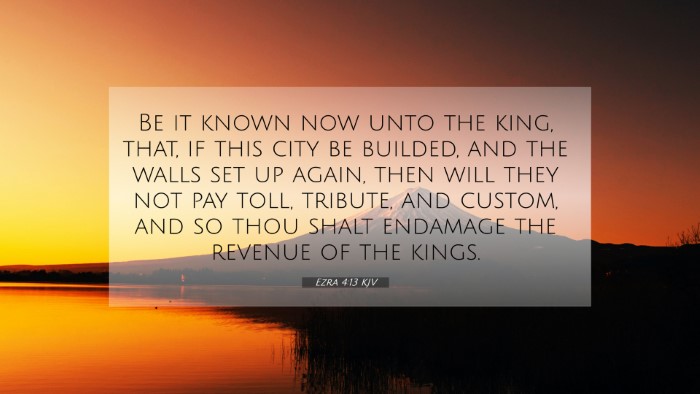Old Testament
Genesis Exodus Leviticus Numbers Deuteronomy Joshua Judges Ruth 1 Samuel 2 Samuel 1 Kings 2 Kings 1 Chronicles 2 Chronicles Ezra Nehemiah Esther Job Psalms Proverbs Ecclesiastes Song of Solomon Isaiah Jeremiah Lamentations Ezekiel Daniel Hosea Joel Amos Obadiah Jonah Micah Nahum Habakkuk Zephaniah Haggai Zechariah MalachiEzra 4:13 Similar Verses
Ezra 4:13 Cross References
Be it known now unto the king, that, if this city be builded, and the walls set up again, then will they not pay toll, tribute, and custom, and so thou shalt endamage the revenue of the kings.
Uncover the Rich Themes and Topics of This Bible Verse
Listed below are the Bible themes associated with Ezra 4:13. We invite you to explore each theme to gain deeper insights into the Scriptures.
Ezra 4:13 Cross Reference Verses
This section features a detailed cross-reference designed to enrich your understanding of the Scriptures. Below, you will find carefully selected verses that echo the themes and teachings related to Ezra 4:13 KJV. Click on any image to explore detailed analyses of related Bible verses and uncover deeper theological insights.
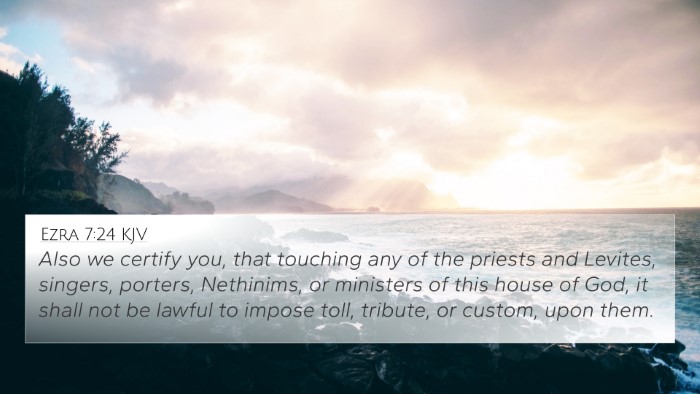
Ezra 7:24 (KJV) »
Also we certify you, that touching any of the priests and Levites, singers, porters, Nethinims, or ministers of this house of God, it shall not be lawful to impose toll, tribute, or custom, upon them.
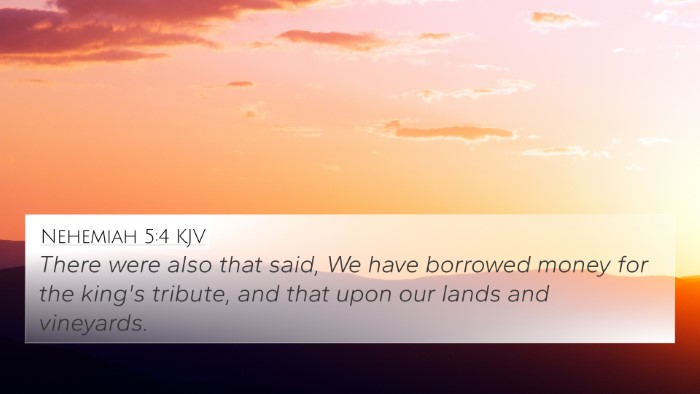
Nehemiah 5:4 (KJV) »
There were also that said, We have borrowed money for the king's tribute, and that upon our lands and vineyards.
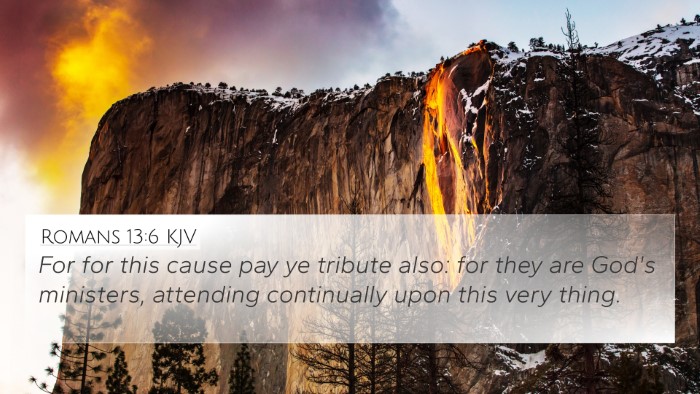
Romans 13:6 (KJV) »
For for this cause pay ye tribute also: for they are God's ministers, attending continually upon this very thing.

Ezra 4:20 (KJV) »
There have been mighty kings also over Jerusalem, which have ruled over all countries beyond the river; and toll, tribute, and custom, was paid unto them.

Psalms 119:69 (KJV) »
The proud have forged a lie against me: but I will keep thy precepts with my whole heart.

Matthew 9:9 (KJV) »
And as Jesus passed forth from thence, he saw a man, named Matthew, sitting at the receipt of custom: and he saith unto him, Follow me. And he arose, and followed him.

Matthew 17:25 (KJV) »
He saith, Yes. And when he was come into the house, Jesus prevented him, saying, What thinkest thou, Simon? of whom do the kings of the earth take custom or tribute? of their own children, or of strangers?
Ezra 4:13 Verse Analysis and Similar Verses
Understanding Ezra 4:13
Ezra 4:13 states: "Be it known unto the king that if this city be builded, and the walls set up again, then will they not pay toll, tribute, and custom, and so thou shalt endamage the revenue of the kings."
This verse highlights the concern of adversaries regarding the rebuilding of Jerusalem and its walls, indicating that such actions could threaten the Persian king's finances and authority.
Contextual Background
Ezra, a leader of the Jewish exiles, aimed to restore worship and the community in Jerusalem after the Babylonian exile. This particular verse emerges from a letter sent to King Artaxerxes by adversaries of the Jews, showcasing their strategical moves to hinder the restoration efforts.
Commentary Insights
Multiple public domain commentaries offer invaluable insights into the implications of this verse:
- Matthew Henry: He emphasizes the motivations of the adversaries in seeking to discredit the Jewish people by underscoring the financial implications of rebuilding the city. Henry notes that political manoeuvring often plays a critical role in thwarting God's work among His people.
- Albert Barnes: Barnes elaborates on the potential danger to Persian revenue should the Jews not comply with tribute requirements. He indicates that the argument presented against the rebuilding is rooted in practical concerns of governance and tribute that could lead to rebellion.
- Adam Clarke: Clarke delves into the socio-political context, noting the history of Jerusalem and the ongoing tension with surrounding nations. He suggests that the adversaries’ tactic was to appeal to the king's interests by painting a picture of instability resulting from the rebuilding.
Key Themes
The verse surfaces significant themes, including:
- Political Opposition: The necessity of discerning political motivations when pursuing divine purposes.
- Financial Accountability: The relationship between civic duty and spiritual responsibilities.
- Community Restoration: The importance of restoring spiritual and social structures in alignment with God’s vision.
Related Bible Cross References
To gain deeper insights into the verse, consider the following biblical cross-references:
- Nehemiah 2:10 - Nehemiah's concern upon hearing about the state of Jerusalem.
- Nehemiah 4:1-3 - The ridicule faced by the builders of the wall.
- Daniel 6:5 - The conspiratorial efforts against God's faithful.
- Acts 5:38-39 - Gamaliel’s advice on handling perceived threats to the authorities.
- Isaiah 52:1 - A call to awaken to restoration after exile.
- Romans 13:1-7 - The relationship between authority and the governed.
- Jeremiah 29:7 - Seeking the peace of the city where you dwell.
- Psalms 122:6 - Peace sought for Jerusalem, emphasizing a spiritual responsibility towards the city.
- Matthew 22:21 - Jesus on giving to Caesar what belongs to Caesar.
- 1 Peter 2:13-14 - Submission to every ordinance of man for the Lord's sake.
Connections Between Bible Verses
Understanding Ezra 4:13 requires us to explore the connections between these verses and their implications for current readers. Each reference serves as a reminder to balance faith with the realities of our environments.
Cross-Referencing Biblical Texts
When studying Ezra 4:13, tools for Bible cross-referencing can enhance understanding. Engaging in comparative Bible verse analysis allows believers to see how God’s word addresses complex situations involving authority, restoration, and worship.
Practical Applications
In using a cross-reference Bible study approach, Christians can better grasp how faith intersects with daily life challenges, similar to the situation in Ezra. By assessing the interplay among various verses, believers may discover how to stand firm in their spiritual endeavors despite opposition.
Conclusion
Ezra 4:13 stands as a poignant reminder of the challenges that come when efforts align with God's will. By exploring its meaning through the insights of esteemed commentaries and carefully chosen scripture linkages, believers can draw strength from the word of God in their journey of faith.
